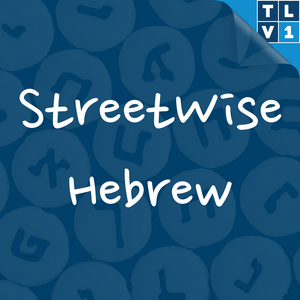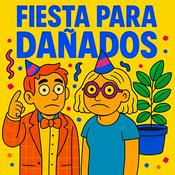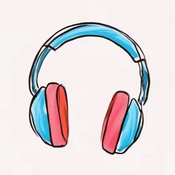481 episodios

#80 High-Tech Hebrew
06/1/2026 | 8 min
You can't be in the Start-up Nation and not know how to talk tech in Hebrew. Guy teaches us how to say "attachment," "text message," and "chat" in Hebrew, and how to conjugate the verb לסמס. Things are about to get geeky! Hear the All-Hebrew Episode on Patreon New Words and Expressions: Telefon nayad, telefon cellulari – Cellphone – טלפון נייד, טלפון סלולרי Titkasher elay la-nayad – Call me on my cellphone – תתקשר אליי לנייד Pelephone – Cellphone – פלאפון "Talpeni, talepni" – Call (Imp. fem) – טלפני, טלפני "Mitkasher elayich at lo ona" – I am calling you, you don't answer – מתקשר אלייך את לא עונה Telefon Kavi – Home phone, landline – טלפון קווי Titkasheri elay rega lakavi – Call me on my landline for a sec. – תתקשרי אליי רגע לקווי Mekoovan – Online – מקוון Sheroot mekoovan – Online service – שירות מקוון "Ba-boker kibalti email katsar ve-nechmad" – In the morning I got a short and nice email – בבוקר קיבלתי אימייל קצר ונחמד Imeylim, meilim – Emails – אימיילים, מיילים Doar electroni (doel) – Email – דואר אלקטרוני, דואל "Lo sholchim misron bi-nhiga" – You don't send a message while driving – לא שולחים מסרון בנהיגה Misron – SMS, message – מסרון "Ata shloe'ach hoda'ah" – You're sending a message – אתה שולח הודעה Lesames le-mishehu – To send an sms to someone – לסמס למישהו Lehistames – To sms one another – להסתמס Histamasnoo kama sha'ot – We chatted via sms for a few hours – הסתמסנו כמה שעות Lishloach hoda'ah – To send a message – לשלוח הודעה Shalachti lo hoda'ah – I sent him a message – שלחתי לו הודעה Yisoom, yisoomon, aplikatsya – Cell phone application – יישום, יישומון, אפליקציה Yisoomonim le-telefonim chachamim – Smart phone applications – יישומון לטלפונים חכמים Leyasem – To implement – ליישם Eich lehorid shirim – How to download songs – איך להוריד שירים Patschan – Hacker – פצחן Lefatse'ach – To crack – לפצח Tsroofa – Attachement – צרופה Mirshetet – Internet – מרשתת Blog – Yoman reshet – בלוג Lechotet – To chat – לצ'וטט Playlist and Clips: Shlomo Artzi – Talpeni, talpeni (lyrics) Doda – Erev Avood (lyrics) HOT TV – Commercial Miri Messika – Af Ahat (lyrics) Misron – Sms Sarit Hadad – Hoshevet Alecha (lyrics) Eich lehorid shirim Ep. no. 155 about lehorid, to download Ep. No. 208 about limsor, to pass HEB

An End-Of-The-Year Offer Too Good to Miss
28/12/2025 | 2 min
If you've ever considered becoming a Streetwise Hebrew patron but haven't gotten around to it, now might be the best time to join and gain access to our all-Hebrew episodes. Starting January 1st, our entry level Patron tier will see its first ever price increase since we started using Patreon more than 10 years ago. The price change only applies to new patrons who sign up after the end of this year. Existing patrons and those who sign up in the coming days will continue paying the current monthly rate. By signing up before the end of the year, you're effectively getting a 37% discount, because the current $5 tier will go up to $8. Existing Patrons, at all tiers, will not see any change to their monthly fees. Go to patreon.com/streetwisehebrew and see if it's right for you.

#95 In Case of Emergency, Call Streetwise Hebrew
23/12/2025 | 7 min
Many things "happen" here in the Holy Land, which is why the root "kara" – ק.ר.ה – with all its derivatives, is so popular. Guy Sharett explains how it's related to murder, earthquakes, and soy milk, and finishes with an anecdote (in Hebrew) about a lady called Carmela. Hear the All-Hebrew Episode on Patreon New Words and Expressions: Karah – Happened – קרה "Ma kara la-yeled" – What happened to the child – מה קרה לילד Ma kara, ma kara? – What on earth? – מה קרה, מה קרה Ma koreh achi? – What's going on, dude? – מה קורה אחי Az ma od koreh itach – So what else is happening with you? – אז מה עוד קורה איתך Ma koreh im… – What's happening with… – מה קורה עם Ma kara im – What happened to… – מה קרה עם Tagidi ma kore itach? – Tell me, what's happening with you – תגידי מה קורה איתך Ma koreh itach? – What on earth is going on with you? – מה קורה איתך Ma leazazel koreh itcha? – What the hell is going on with you? – מה לעזאזל קורה איתך Ze ma she-kara – This is what happened – זה מה שקרה Ze lo kore li – It's not happening to me – זה לא קורה לי Ze lo yikre shuv – It won't happen again – זה לא יקרה שוב Kara mashehu? – Did something happen? – קרה משהו Nu ve-kara mashehu? – So did something happen? – נו, וקרה משהו Mikreh, mikrim – Case, cases – מקרה, מקרים "Ani gam kacha mikreh avud" – Anyway I am a lost cause – אני גם ככה מקרה אבוד Mikre katseh – Edge case – מקרה קצה Mikre cherum – Emergency – מקרה חירום Be-mikre cherum ata yachol tamid lehitkasher elai – In case of an emergency you can always call me – במקרה חירום אתה יכול תמיד להתקשר אליי Mikrey retsach – Murder cases – מקרי רצח "Ani rotseh lifgosh ota pit'om be-mikreh – I want to meet her suddenly, by chance – אני רוצה לפגוש אותה פתאום במקרה Be-mikreh – Accidentally – במקרה Ze kara be-mikreh – It happened accidentally – זה קרה במקרה Yesh lachem be-mikreh chalav soya? – Do you happen to have soy milk by any chance? – יש לכם במקרה חלב סויה Le-mikreh she – In case you need me, here is my number – למקרה שתצטרך אותי, הנה המספר שלי Be-mikreh shel re'idat adama – In case of an earthquake – במקרה של רעידת אדמה Bechol pgisha mikrit – At every random meeting – בכל פגישה מקרית Mikri – Random – מקרי Mikriyoot – Coincidence – מקריות Playlist and Clips: Matti Caspi – Yemei Binyamina (lyrics) Moshe Peretz – Ma Kore Itach (lyrics) Ozi Zoltak – Afilu Lo At (lyrics) Meir Ariel – Pluga Ba-kav (lyrics) Arik Lavie – Haya o lo haya (lyrics) Ep. no. 16 Cursing Drivers in Hebrew HEB Ep. no. 79 about the flow of conversation HEB

#445 It's a Serious Leak
16/12/2025 | 7 min
From leaking documents to a leaky faucet at home, the root דלפ is an interesting one, and from which we get the Hebrew word for whistleblower. Hear the All-Hebrew Episode on Patreon New Words and Expressions: Ha-mazgan dolef – The air conditioning unit is leaking – המזגן דולף Tsinor dolef – Leaking pipe – צינור דולף Dlifa – Leaking – דליפה "Yesh lanoo dlifa ba-mazgan" – We have a leak in our AC unit – יש לנו דליפה במזגן "Yesh lanoo dlifa me-hatikra'" – We have a leak from our ceiling – יש לנו דליפה מהתקרה Dlifat gaz – Gas leak – דליפת גז Dlifot neft – Oil spills – דליפות נפט Dalaf tik mismachim – A dossier was leaked – דלף תיק מסמכים Ha-meida dalaf – The information leaked – המידע דלף Eich dalaf ha-meida? – How did the information leak? – איך דלף המידע Dlifat meida – Information leak – דליפת מידע Mi hidlif et ha-meida? – Who leaked the info? – מי הדליף את המידע Hu hidlif mismachim – He leaked documents – הוא הדליף מסמכים Hi hidlifa mismachim – She leaked documents – היא הדליפה מסמכים Hadlafat meida – Information leak – הדלפת מידע Madlif – Leaker, whistleblower – מדליף, מדליפה Mi ha-madlif/a? – Who is the leaker? – מי המדליף Ha-sirton hudlaf – The video was leaked – הסרטון הודלף Ha-sirton ha-mudlaf – The leaked video – הסרטון המודלף Ha-pratim ha-mudlafim – The leaked details – הפרטים המודלף Playlist and Clips: Danny Litani – Shalechet (lyrics) Midrag – Dlifat gaz Dlifat neft – Fuel leak Calcalist – Neft, politika ve-goofot Hidlifa Nurit Galron – Shalechet (lyrics)

#86 This Show's Getting More and More 'Od'
09/12/2025 | 8 min
"Od, od, od!" – we're always wanting more. How do we ask for more milk, for an encore or for another goal in a football game? You guessed it, we use "od." Guy Sharett tells us more… Hear the All-Hebrew Episode on Patreon New Words and Expressions: Od – More, else, still – עוד Ken, od tipa – Yes, a tiny bit more – כן, עוד טיפה Efshar od chalav? – May I have a bit more milk? – אפשר עוד חלב "Ma od bikasht?" – What else did you ask for? – מה עוד ביקשת Ma od vaksha? – What else would you like? – מה עוד בבקשה Od mashehu? – Anything else? – עוד משהו Ma od, ata rotseh gam café? – What else, do you want a cup of coffee as well? – מה עוד, אתה רוצה גם קפה Mi od ba? – Who else is coming? – מי עוד בא Tagidi li od paam – Tell me one more time – תגידי לי עוד פעם "Od ha-paam" – One more time – עוד הפעם "Ata od tegaleh et ha-olam" – You'll still discover the world – אתה עוד תגלה את העולם Yesh adayin zman, yesh od zman – There's still time – יש עוד זמן, יש עדיין זמן Daber iti be-od yomayim – Talk to me in two days – דבר איתי בעוד יומיים Od me'at – In a bit – עוד מעט Kol od – As long as – כל עוד "Kol od oleh ha-boker" – As long as the sun is rising – כל עוד עולה הבוקר Kol od hu medaber kacha, ani lo adaber ito – As long as he talks like this, I won't talk to him – כל עוד הוא מדבר ככה, אני לא אדבר איתו "Od lo tamu kol pla'ayich" – Your wonders are not over yet – עוד לא תמו כל פלאייך Od lo achalti – I haven't eaten yet – עוד לא אכלתי "Eich eda ve-odeni yeled" – How will I know, when I am still a child? – איך אדע ועודני ילד Playlist and Clips: Erik Berman – Ma Od Bikasht? (lyrics) Pablo Rosenberg – Tagidi Li Od Pa'am (lyrics) Gidi Gov – Inyan shel Zman (lyrics) Yoni Rechter & Eli Mohar – Kol Od (lyrics) Rami Kleinstein – Od Lo Tamu Kol Pla'ayich (lyrics) Ha-kol Over Habibi – Odeni yeled (lyrics)
Más podcasts de Educación
Podcasts a la moda de Educación
Acerca de Streetwise Hebrew
Escucha Streetwise Hebrew, El Podcast de Marco Antonio Regil y muchos más podcasts de todo el mundo con la aplicación de radio.net

Descarga la app gratuita: radio.net
- Añadir radios y podcasts a favoritos
- Transmisión por Wi-Fi y Bluetooth
- Carplay & Android Auto compatible
- Muchas otras funciones de la app
Descarga la app gratuita: radio.net
- Añadir radios y podcasts a favoritos
- Transmisión por Wi-Fi y Bluetooth
- Carplay & Android Auto compatible
- Muchas otras funciones de la app


Streetwise Hebrew
Descarga la app,
Escucha.





































